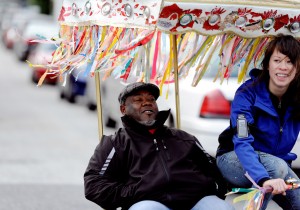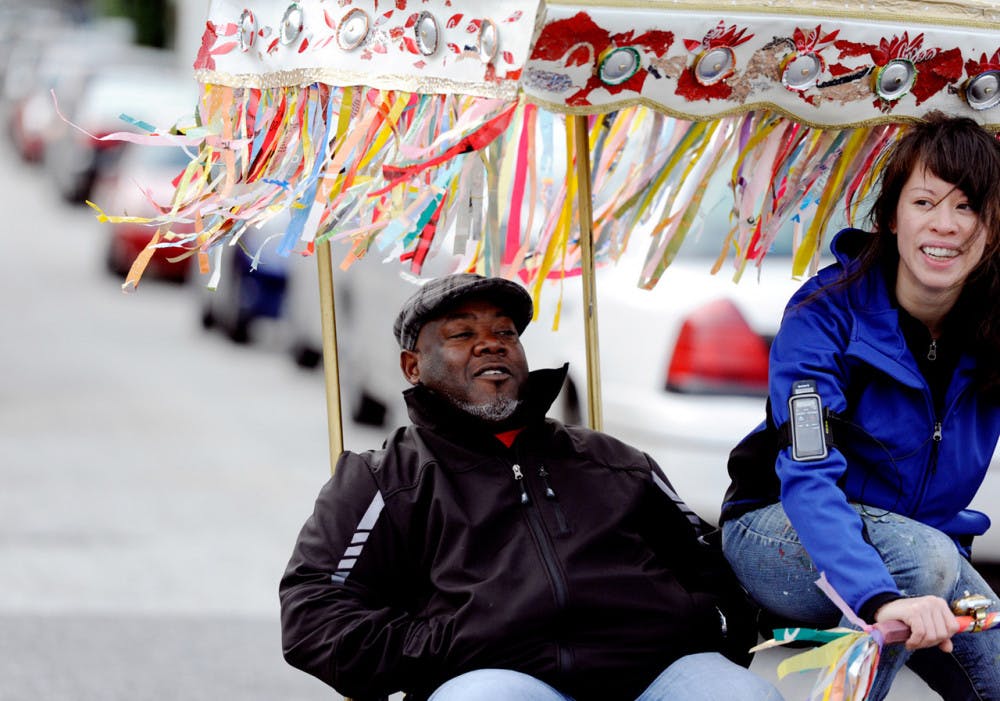By Gabrielle Okun
Correspondent
The College’s ongoing Alumni Art Exhibition showcases a variety of drawings, paintings, prints, sculptures, videos, mixed media works and an interactive installation all from College graduates. These exceptionally creative alumni emphasize the College’s hands-on approach to learning. Perhaps most striking are the artists’ incorporations of community-engaged learning into their pieces.

The Bonner Program and Liberal Learning classes emphasize the College’s devotion towards making students aware of social issues through active involvement in the community. This hands-on approach to learning allows students to become more passionate about issues and pioneer innovative ways to communicate their ideas. Clearly, these programs have had a major influence on College students past and present.
Michelle Nugent, alumna from the class of ’09, expressed the College’s community influence in her own artistic vision. Although Nugent was not a Bonner scholar, she did a joint program with Bonner and the National Conference of Undergraduate Research involving art and youth programming. The program is similar to the College’s student research program MUSE.
“I don’t think art has to be a classified tool to create awareness about issues, but more to recognize and understand each other,” Nugent said.
As a former fine arts major who now teaches at the College, Nugent credits the art department for her development as an artist. The small class sizes offered students the ability to have a more individualized learning experience with their professors. Their commitment to innovation allowed students to explore their creative limits not solely within an indoor studio.
The faculty was devoted to engaging students in their development as artists, according to Nugent. Professors incorporated the Trenton community into their classes, which gave students more freedom for expression as well as nearby social and cultural influences for their creative visions. By working in the community, such as having the opportunity to create murals around Trenton, students gain hands-on experience by working alongside other artists and understanding the implications of their artwork.
By encouraging interaction and communication, students were allowed to explore art not only visually, but also as a medium for communication. Nugent’s “The Pedicab Project” showcases these values by reaching out to different people in a community.
“People see people differently from biking than from driving,” Nugent said.
From peddling pedestrians around on a pedicab with short, five-to-eight minute conversations, Nugent discussed social justice issues that are more often expressed in higher education.
Her work is a way to express social justice issues in the United States by looking into subsections of race, ethnicity and identity. Feeling that many of these pedestrians were misunderstood, stereotyped and labeled with false assumptions, Nugent was inspired to create her piece. Still, she wanted the message to be clear to an everyday onlooker by creating an interactive, community component.
A self-described introvert, Nugent used a pedicab to discuss personal issues which allowed pedestrians to open up about their own identities and heritages as well as her own. She noticed the use of pedicabs as a critical form of transportation as well as a method of communication between the peddler and pedestrian.
Being half-Filipino, Nugent began exploring her ethnicity and heritage during her time at the College, which she calls the “catalyst” for designing an artistic piece to take this self-discovery to a new level. The project, incorporating many different media styles, allows the piece to stand out to others and for everyone to have their own interpretation of the piece.
Aside from being recognized in the art gallery, Nugent is also a part of other nonprofit organizations that also use art to connect with a community. Bike Revolution is a nonprofit group aspiring to make bikes more accessible to Philadelphia’s youth. This program teaches children how to bike and even use art and expression to design an individualized bike. Through this organization, she hopes to make bikes more accessible, teach others how to maintain bikes and even develop ways for improved city planning.
In addition, Nugent aims to start up a new program, Trentonworks, which is a multifaceted approach to engage the community and students in learning about social justice issues. Nugent hopes to develop an art gallery to make art more accessible for the Trenton community, as well.
In retrospect, Nugent has utilized community values ingrained within the College’s mission in order to shape her artistic path for the future.







